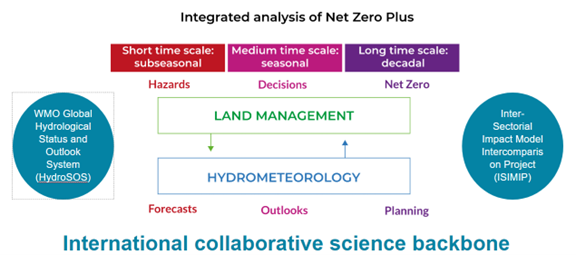Science and tools generated by the International Science for Net Zero Plus programme, working closely with key partners across the three domains (global, South East Asia and Sub-saharan Africa), will help to better our understanding of the land-water-air system and its complex interactions that affect transition to Net Zero Plus and climate change resilience, and enable more informed decisions.
The need
Land management (or use) can help with climate mitigation through absorbing more carbon dioxide and reducing other greenhouse gas (GHG) emissions, for example, by growing more trees or re-wetting peatlands. As more demands are made of land to feed a growing population, it is unclear what space there can be for these land-based climate mitigation activities as well as for nature and biodiversity. Meanwhile, the changing climate is bringing more extreme weather, which impacts on our safety and the wider environment.
Country Parties who are signatories to the 2015 Paris Agreement are expected to submit plans to reduce GHG emissions and adapt to the impacts of climate change every five years as part of their Nationally Determined Contributions (NDCs). However, developing and delivering realistic and comprehensive plans while reconciling competing priorities is very challenging.
Decisions about land and water management, about investments to increase carbon uptake (and reduce losses) and towards climate adaptation are often being made without access to pertinent information, for example how sustainable or how effective they might be, given changes in climate and what the consequences of these changes may be at a wider scale.
As such, the programme, working closely with key partners across the focal geographies, focuses on understanding the land-water-air system and its complex interactions that affect transition to Net Zero Plus and how we can build resilience to climate change.
The science
Major global climate and Net Zero Plus services are currently delivered through established international model-data frameworks with UN and international science support. Advancing the capability of these frameworks to represent the complexities of greenhouse gas mitigation, ecosystem trade-offs and changing hydro-climatic extremes, forms the backbone of the programme.
In particular, UKCEH scientists are working with partners to advance the Inter-Sectoral Impact Model Intercomparison Project (ISIMIP), advancing land surface models to deliver an improved multi-model global assessment of Net Zero Plus, linked to scenario models.
For short-term hydro-meteorological outlooks and forecasts, UKCEH are working to blend global prediction systems with local and regional data in the WMO HydroSOS system (led by UKCEH) to support National Meteorological and Hydrological Services in providing accessible hydrological information.

